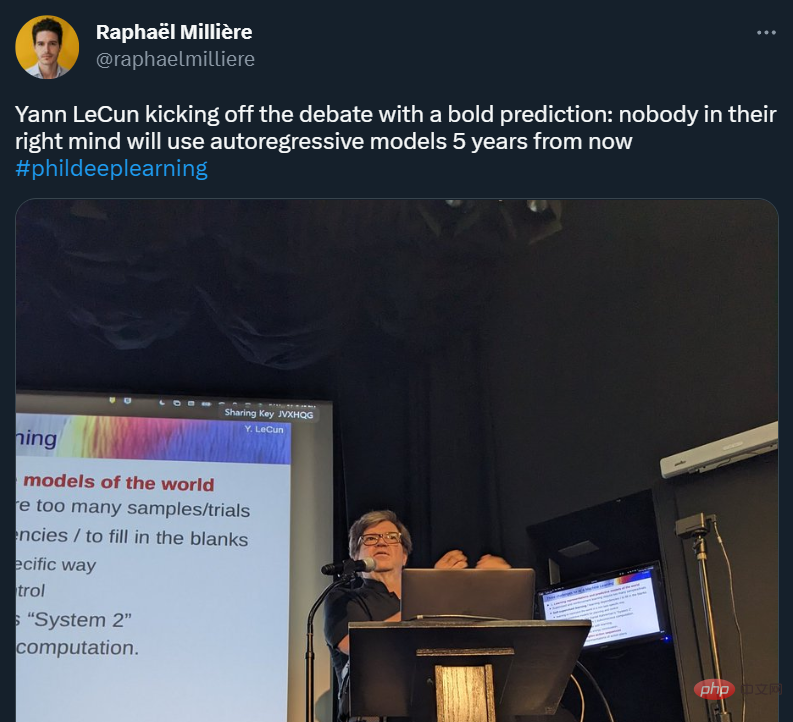As the legal industry continues to develop rapidly, it is clear that generative AI will play a revolutionary role in the way legal services are provided. From streamlining the contract review process to automating document discovery, generative AI is already being used to improve execution efficiency and reduce operating costs in the legal industry. However, this is just the tip of the iceberg of the potential impact of AI technology. As AI continues to advance, it is even expected to completely change the way lawyers work and subvert the underlying structure of the legal industry.

Please note that the above content was not written by the editor, but was automatically generated by ChatGPT based on the following prompts:
Written by Forbes In human xxx style, write the opening paragraph of an article on how transformative generative AI is disrupting the legal industry.
ChatGPT output the above answer in a few seconds and shocked us for days. There is no doubt that friends who have experienced OpenAI ChatGPT, DALL-E 2 or other generative AI tools will have similar reactions. And this is just the beginning... Sam Altman, CEO of OpenAI, believes that the current version of GPT is far from truly mature. He recently tweeted, "ChatGPT still has big limitations, but it's good enough in some aspects that it even gives a strong misleading impression. It's not appropriate to rely on it for anything important yet. It's just technology A preview of progress, we still have a lot of work to do in terms of robustness and authenticity."
Perhaps the "cold water" poured out by Altman is to remind everyone that ChatGPT is still just a prototype. It is clear that this model occasionally makes factual errors and often makes nonsense. Perhaps, he wants to throw out the problem first, and then make significant improvements through the upcoming GPT-4.
Technical writer Rob Toews, who pays attention to AI trends, wrote, "The recent hype around ChatGPT is crazy, and this is just a warm-up project before GPT-4 comes on stage." Toews predicts that the new version may have multi-mode capabilities Capabilities - Ability to process images, videos, and other data patterns in addition to text. This means that the model can use input text prompts to generate images or videos, and can in turn generate answers in text format based on input images or videos.
The advancement of AI technology is not limited to generative AI. In fields related to machine learning, prediction and decision-based models are formed by running training algorithms based on multiple large data sets, and technologies such as RegulaAltion's AIR Platform are being launched one after another. AIR supports multi-business collaboration across large data sets and can quickly build more powerful AI models. Traditional barriers to privacy, traceability, trust and security are addressed through decentralized peer computing with features like blockchain/smart contracts. This enables data owners to share insights from their data without moving or relinquishing custody/control.
Besides the hype, what’s the truth?ChatGPT caused a stir for many reasons. It makes AI technology accessible, practical, easy to use and widely applicable to users who lack relevant background for the first time. It can provide detailed and intelligent answers in comprehensive knowledge areas. It has the advantages of speed, erudition, fluency and thoughtfulness, and can provide nuanced responses to complex problems. Its mastery of content and understanding of specific styles of expression or literary techniques are equally impressive.
Unlike the comprehensive resource lists that are filterable and reviewable for relevance provided by search engines like Google, ChatGPT can organize, integrate, summarize and generate grammatically correct, well-expressed and cross-cutting resources in seconds. Available outputs for multiple disciplines.
ChatGPT caused such a sensation, but there are actually deeper reasons. It is a tool that pushes technological capabilities into the realm of human creativity, blurring the boundaries between machines and humans for the first time. It does not require any coding skills or subject background to use, and it can be used to start broad or in-depth "conversations" based entirely on prompts. What’s more, its response also shines with humanity.
ChatGPT really surprised the whole world. In an era where changes are becoming increasingly rapid and unstoppable, ChatGPT stands out with its excellent scope of application, speed and intelligence. What’s exciting about it is also what’s terrifying about it, and it’s no wonder it evokes so many mixed emotions of awe, fear, and excitement in an instant.
ChatGPT dominates the headlinesSince the prototype was released by San Francisco-based OpenAI on November 30, 2022, ChatGPT is rapidly gaining popularity. Within five days of its release, it also welcomed 1 million users, and the rapid growth often caused user access delays due to high server load.
The New York Times reported that Google CEO Sundar Pichai therefore issued a "red code" in response to the threat ChatGPT posed to Google's search business. An article in the Financial Times reported that Microsoft has invested US$3 billion in OpenAI and is discussing investing an additional US$10 billion. When technology giants respond with practical actions, the entire business world and even the world will be shaken.
According to the technical column, generative AI can not only answer complex questions covering various knowledge fields, but also integrate these knowledge bases. Given the right prompts, it can connect the dots across disciplines, which is a must-have for high-end talent in today’s market. It can write and debug computer programs, compose music, write and grade student papers (which has caused consternation in the education system and academia) and even compose poetry. Scientists used an earlier version of GPT to create new protein sequences. What's more terrible is that, according to OpenAI, this is just the beginning...
Leading consulting service companies have also keenly captured this trend. McKinsey claims that generative AI tools such as GPT and other technological advances will start from Fundamentally disrupt existing businesses. They also identified a wide range of use cases for it: marketing and sales, operational IT/engineering, risk and legal, human resources and streamlined customer service, among others. However, the power of machines alone is not enough to eliminate malicious intent, which requires a human element to be added. This processing loop, built by humans and machines, is a critical but often underestimated component of digital transformation.
Generative AI, along with other tools such as robotics and data insights enablement platforms, has the potential to improve business and human experiences. But realizing this potential requires investments in people—change management, cultural fit, lifelong learning, diversity, new hiring standards, upskilling, a cross-functional workforce, supply chain integration, and more.
The accelerated pace of technological change has increased the importance and urgency of these tasks. Large enterprises are working hard to invest in the human element of digital transformation. They know clearly that the success of the digital journey depends not only on technology and data analysis, but also on people's adaptability, creativity, curiosity, agile collaboration and teamwork. The legal function has an important role to play in this process, so it must lead, not lag. But how do you get ahead?
How does the legal industry embrace tools such as GPT?
The legal industry has always been difficult to coordinate, but it is quite united in resisting change. Law’s traditional stakeholders—including lifelong learners, law firm partners, corporate counsel, judges, and regulators alike—are united in their opposition to major change. Everyone has their own reasons for rejection, but what they have in common is that they talk about "innovation" all the time, but they resolutely defend the status quo. The incremental changes they tacitly endorse never benefit end users or the masses at large.
Law is also one of the last handicraft industries in the digital age. Public trust in lawyers is declining - opaque, extremely slow, procrastinating, costly, lawyer-centered, judicial procedures full of uncertainty, etc.; legal education has completely failed and is unable to cultivate students with good economic status and in line with market demand. graduates; the judiciary itself has begun to become a factor that induces crises, erodes the foundation of the rule of law, and even shakes the premise for the operation of a democratic society. But today's legal industry has no choice. Turbulent times are bound to come and have already come.
The legal market is divided into two clear and independent categories: civil law (for individuals and small and medium-sized enterprises) and corporate law (for large companies and wealthy individuals). In the short term, ChatGPT will have different impacts on the two, mainly at the civil law level. If tools like ChatGPT can remain open and low-cost, legal services will truly democratize, change the role of lawyers, and impact the outdated judicial system.
The distinguished "legal futurist" Richard Susskind once said, "We see here a solution to global justice problems - new tools that will allow people without legal knowledge to understand and defend themselves legal rights; enabling people to draft documents on their own, obtain legal guidance without a lawyer, and assess their own legal risks. Although everything is just getting started, the path forward is already clear."
ChatGPT builds on and extends the pioneering work of civil law services companies such as Legal Zoom, Rocket Lawyer and DoNotPay, which are all trying to use technology to give more people access to fast, low-cost, legally compliant assistance. ChatGPT brings more powerful tools to users, which can be easily used without any professional background. It can help people save the cost of hiring lawyers and eliminate uncertainty, while also helping to demystify legal procedures and judicial language.
Putting aside the positive significance at the civil law level, it is obviously impossible for the business community, especially the law firms, to have such widespread enthusiasm for ChatGPT, which shakes the foundation of their own interests.
Practitioners on the enterprise side are mainly divided into law firms and company (internal) legal teams. The two diverge dramatically in terms of purpose, mindset, relationships with customers, success metrics, and economic positioning. The company's legal team often understands the actual situation of the company, leadership style, risk profile, supply chain system, business strategy, economy, products/services and other specific risk factors better than external consultants.
Company legal teams, especially senior executives, are increasingly gathering around business leaders with legal backgrounds. They are no longer "lawyers" in the traditional sense. They understand the language of business, have the ability to act cross-functionally, have established personal relationships with both the executive team and key business managers, and become part of the business structure. "Working with customers" is by no means a simple slogan for them, but the truest reality. “Alignment”, “Teamwork”, “Value Creation”, “Digital Transformation”, “Skill Improvement” and “Agility” are also self-learning goals that these practitioners must achieve.
Most corporate legal teams will cautiously but curiously classify tools like ChatGPT as “drafting tools,” at least initially. Top teams, such as the DXC legal team led by Bill Deckelman, have long realized the importance of combining professional lawyers, outsourcing experts and digital technology. Deckelman welcomes the potential impact of generative AI on the legal field. He shared, "ChatGPT represents a paradigm shift in AI, and more advanced models will soon appear. The application of generative AI technology will likely subvert the traditional legal practice model."
But most lawyers Law firms will regard tools like ChatGPT as an evil force that will destroy their jobs. In the future, clients will definitely not be willing to pay to help law firms train interns. Therefore, they will use "scare tactics" to customers, warning them of the unpredictable and inaccurate potential risks of these new, relatively untested technologies. This short-sighted, self-interested defensive behavior may lead some legal teams to deliberately limit the use of generative AI tools and insist on a "lawyer oversight" approach. Of course, none of this is new - from the early days of email and e-discovery to broader digital transformation, the response of a considerable number of law firms has always been passive and conservative.
A managing partner revealed, “Only after big clients put pressure on the law firm will be forced to accept it. But everything done is not to really invest to realize the hidden value, but to Use fancy face-saving projects to fool you." This deliberately short-sighted mentality is very common in the field of law firms, and the reasons are not difficult to understand. In short, this resistance will eventually dissipate as customers exert greater pressure for change and/or as asymmetric competitors enter the legal market.
From another perspective, whoever can proactively embrace the future will be able to stand out in terms of talent recruitment, customer attraction and corporate business expansion. Specific ideas include:
> Invest in establishing new practice areas (such as generative AI, data agility and other emerging areas);
> Provide "cutting edge" in the legal, business and technology fields job opportunities, attracting top talents from multiple disciplines;
> Freeing lawyers from "drudgery" because generative AI can be faster, more efficient, and even more reliable and better Get these done;
> Invest in agile training and upskilling, proactively identify and prepare for new opportunities;
> Build customer-driven solutions that advance business goals and Enhance the customer experience rather than simply deal with the "legal process".
Joe Andrew, chairman of the world’s largest multinational law firm, once said, “When large law firms begin to adopt new technologies, they will not only be able to provide better services to their clients, but they are also expected to attract the most clients by reducing costs. Excellent talent. The traditional drudgery in the legal process will be replaced by a high degree of automation, and the future destiny of each law firm actually depends on what kind of talent it can attract and retain."
Amazon Technology giants such as Microsoft, Microsoft and Google, as well as the Big Four accounting firms, will increasingly become important participants in discussions on industry transformation. Ernst & Young recently separated its consulting business from the audit function and announced that the consulting business will transform from a partnership model to a pure firm model. It is clear that they can create cutting-edge technology platforms such as generative AI for large enterprises through cooperation with technology giants, align legal functions with enterprises, employees, customers and supply chains, and promote corporate ESG/DEI (environmental, social and social issues). and corporate governance/diversity, equity, inclusion) and other efforts.
Tech giants are likely to choose to leverage their technological prowess to expand their existing footprint in the legal industry. They already have the brand, capital, data, customer base, competitive funding, expertise, talent, vision and transformation experience that will fundamentally change the landscape of the entire legal industry and reshape the legal system as we know it. Of course, all this will not eliminate lawyers as a professional group, but it will undoubtedly change their roles, tasks, organizational and economic models, educational backgrounds, training and client orientation.
Summary
Platforms such as generative AI, data analysis, robotics, and the Metaverse are currently just business and social tools and have not been accepted as "legal technology" . But they will soon become a widely used, universally recognized and integral part of business and society. This will bring all-round pressure to the legal industry, forcing them to either accept and transform into new forms in the new ecology, or be crushed by ruthless market competition. And that day will come sooner than most lawyers. The reason why this will become a historical necessity is that in addition to conservative lawyers themselves, this is great news for businesses and society, and will also be an excellent opportunity to unleash the full potential of the legal function.
The above is the detailed content of 'The potential and challenges of generative AI in the legal industry”. For more information, please follow other related articles on the PHP Chinese website!
 ai合并图层的快捷键是什么Jan 07, 2021 am 10:59 AM
ai合并图层的快捷键是什么Jan 07, 2021 am 10:59 AMai合并图层的快捷键是“Ctrl+Shift+E”,它的作用是把目前所有处在显示状态的图层合并,在隐藏状态的图层则不作变动。也可以选中要合并的图层,在菜单栏中依次点击“窗口”-“路径查找器”,点击“合并”按钮。
 ai橡皮擦擦不掉东西怎么办Jan 13, 2021 am 10:23 AM
ai橡皮擦擦不掉东西怎么办Jan 13, 2021 am 10:23 AMai橡皮擦擦不掉东西是因为AI是矢量图软件,用橡皮擦不能擦位图的,其解决办法就是用蒙板工具以及钢笔勾好路径再建立蒙板即可实现擦掉东西。
 谷歌超强AI超算碾压英伟达A100!TPU v4性能提升10倍,细节首次公开Apr 07, 2023 pm 02:54 PM
谷歌超强AI超算碾压英伟达A100!TPU v4性能提升10倍,细节首次公开Apr 07, 2023 pm 02:54 PM虽然谷歌早在2020年,就在自家的数据中心上部署了当时最强的AI芯片——TPU v4。但直到今年的4月4日,谷歌才首次公布了这台AI超算的技术细节。论文地址:https://arxiv.org/abs/2304.01433相比于TPU v3,TPU v4的性能要高出2.1倍,而在整合4096个芯片之后,超算的性能更是提升了10倍。另外,谷歌还声称,自家芯片要比英伟达A100更快、更节能。与A100对打,速度快1.7倍论文中,谷歌表示,对于规模相当的系统,TPU v4可以提供比英伟达A100强1.
 ai可以转成psd格式吗Feb 22, 2023 pm 05:56 PM
ai可以转成psd格式吗Feb 22, 2023 pm 05:56 PMai可以转成psd格式。转换方法:1、打开Adobe Illustrator软件,依次点击顶部菜单栏的“文件”-“打开”,选择所需的ai文件;2、点击右侧功能面板中的“图层”,点击三杠图标,在弹出的选项中选择“释放到图层(顺序)”;3、依次点击顶部菜单栏的“文件”-“导出”-“导出为”;4、在弹出的“导出”对话框中,将“保存类型”设置为“PSD格式”,点击“导出”即可;
 GPT-4的研究路径没有前途?Yann LeCun给自回归判了死刑Apr 04, 2023 am 11:55 AM
GPT-4的研究路径没有前途?Yann LeCun给自回归判了死刑Apr 04, 2023 am 11:55 AMYann LeCun 这个观点的确有些大胆。 「从现在起 5 年内,没有哪个头脑正常的人会使用自回归模型。」最近,图灵奖得主 Yann LeCun 给一场辩论做了个特别的开场。而他口中的自回归,正是当前爆红的 GPT 家族模型所依赖的学习范式。当然,被 Yann LeCun 指出问题的不只是自回归模型。在他看来,当前整个的机器学习领域都面临巨大挑战。这场辩论的主题为「Do large language models need sensory grounding for meaning and u
 ai顶部属性栏不见了怎么办Feb 22, 2023 pm 05:27 PM
ai顶部属性栏不见了怎么办Feb 22, 2023 pm 05:27 PMai顶部属性栏不见了的解决办法:1、开启Ai新建画布,进入绘图页面;2、在Ai顶部菜单栏中点击“窗口”;3、在系统弹出的窗口菜单页面中点击“控制”,然后开启“控制”窗口即可显示出属性栏。
 ai移动不了东西了怎么办Mar 07, 2023 am 10:03 AM
ai移动不了东西了怎么办Mar 07, 2023 am 10:03 AMai移动不了东西的解决办法:1、打开ai软件,打开空白文档;2、选择矩形工具,在文档中绘制矩形;3、点击选择工具,移动文档中的矩形;4、点击图层按钮,弹出图层面板对话框,解锁图层;5、点击选择工具,移动矩形即可。
 强化学习再登Nature封面,自动驾驶安全验证新范式大幅减少测试里程Mar 31, 2023 pm 10:38 PM
强化学习再登Nature封面,自动驾驶安全验证新范式大幅减少测试里程Mar 31, 2023 pm 10:38 PM引入密集强化学习,用 AI 验证 AI。 自动驾驶汽车 (AV) 技术的快速发展,使得我们正处于交通革命的风口浪尖,其规模是自一个世纪前汽车问世以来从未见过的。自动驾驶技术具有显着提高交通安全性、机动性和可持续性的潜力,因此引起了工业界、政府机构、专业组织和学术机构的共同关注。过去 20 年里,自动驾驶汽车的发展取得了长足的进步,尤其是随着深度学习的出现更是如此。到 2015 年,开始有公司宣布他们将在 2020 之前量产 AV。不过到目前为止,并且没有 level 4 级别的 AV 可以在市场


Hot AI Tools

Undresser.AI Undress
AI-powered app for creating realistic nude photos

AI Clothes Remover
Online AI tool for removing clothes from photos.

Undress AI Tool
Undress images for free

Clothoff.io
AI clothes remover

AI Hentai Generator
Generate AI Hentai for free.

Hot Article

Hot Tools

Atom editor mac version download
The most popular open source editor

mPDF
mPDF is a PHP library that can generate PDF files from UTF-8 encoded HTML. The original author, Ian Back, wrote mPDF to output PDF files "on the fly" from his website and handle different languages. It is slower than original scripts like HTML2FPDF and produces larger files when using Unicode fonts, but supports CSS styles etc. and has a lot of enhancements. Supports almost all languages, including RTL (Arabic and Hebrew) and CJK (Chinese, Japanese and Korean). Supports nested block-level elements (such as P, DIV),

SublimeText3 Linux new version
SublimeText3 Linux latest version

VSCode Windows 64-bit Download
A free and powerful IDE editor launched by Microsoft

ZendStudio 13.5.1 Mac
Powerful PHP integrated development environment






